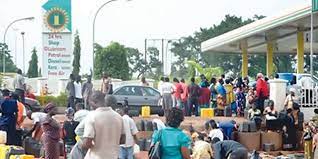The lingering fuel scarcity is biting harder in Kebbi crippling soci-economic activities, the News Agency of Nigeria (NAN) reports.
Investigation conducted by NAN in Birnin Kebbi and its environs reveals that only few filling stations sell Petroleum Motor Spirit (PMS), otherwise known as petrol, at exhorbitant prices.
NAN reports that non of the filling stations in the state capital and its environs sells the product at the regulated price of N185, while the few stations that open for business sell at between N280 and N300 per litre.
The Chairman, National Union of Road Transport Workers (NURTW), Kebbi Central Motorpark (Sabuwar Tasha), Birnin Kebbi, Alhaji Garba Dan-Malam, said the situation had become worrisome.
Dan-Malam, who expressed optimism that the government would bring the situation under control, said the scarcity, which had been lingering for a while had negatively affected his members.
He observed that the fuel scarcity and hike in its price had crippled soci-economic activities of Nigerians, noting that for commercial activities to take place, people, goods and services must move from one place to another.
The chairman said despite the increase in fuel price, transport fares charged by members of the union were reasonable.
He, however, lamented that members of the union were not happy with the current situation.
READ ALSO:
- Buhari Returns From US-Africa Leaders Summit in Washington
- NDLEA Intercepts 1.7million Opioid Pills In Noodles, Others At Lagos Airport
- Avoid Excessive Speed on Lagos-Ibadan Highway; Federal Controller of Works Warns
“As leaders, we keep advising our members to be patient; things will be better. This is because we have hope in the present administration.
“As motorists, we are not only concerned with high cost of fuel but also high costs of vehicle spare parts.
“A typical example is, just last year, we used to buy a tyre from N27,000 to N28,500 but now it goes for between N59,000 and N61,000.
“However, for those travelling outside the country will bear witness that the current inflation is not restricted to Nigeria. It is a global trend that engulped economies across the globe,” he advised.
In view of the hike, “We advised our members engaged in long journeys not to use all the passengers’ money to purchase fuel, instead, they should break it into three.
“So that in the event of vehicle breakdown, they can have some money on them to get another vehicle for the passengers to carry on with their journey.”
On his part, a motorist, Malam Aliyu Yusuf, lamented that the hike in fuel price had affected his monthly budget, saying that he had to cut down some expenses of less value to meet his fuel needs.
“Apart from cutting down some of my expenses, I also minimised my movement, I go to my place of work which is obligatory upon me but as far as visits are concerned, I visit places that are extremely necessary and important.
“My brother runs a business centre and he uses petrol to power his generating sets but the hike in fuel forced him to review some of his charges.
“However, it it’s not everybody that understands, he bitterly complained about low patronage.
“The experience is actually terrible, buying fuel at the rate of N290 to N300, this is unacceptable; government needs to do something urgently to address the situation for the good of Nigerians as well as the nation,” he said.
When contacted, the Chairman, Independent Petroleum Marketers Association of Nigeria (IPMAN), North-West Zone, Alhaji Muhammad Tila, blamed the Nigeria National Petroleum Corporation Ltd. (NNPCL) for the lingering problem.
He said NNPCL was the only company responsible for importing fuel into the country, saying that many drivers used to spend seven to eight days on queues to lift the commodity to the north.
“The frustration is too much, sometimes they end up waiting in vein. As such, the last option is to buy the commodity from major marketers at exhorbitant price of N250 per liter, transport it to the North at the cost of N30 per liter.
“When we bring it here, we cannot sell it at N280, therefore, people should reason with us,” he noted.
The chairman recalled that the Department of Security Services (DSS) gave the statekeholders in the petroleum idustry 48 hours ultamatum, yet, the fuel was not available, especially in the north.
Tila said before Nigeria used to have 10 to 20 ships on the sea waiting to offload, “but now you hardly see two ships on the shores of Nigerian sea.”
He stressed the need for government to allow private registered depots to import the commodity.


